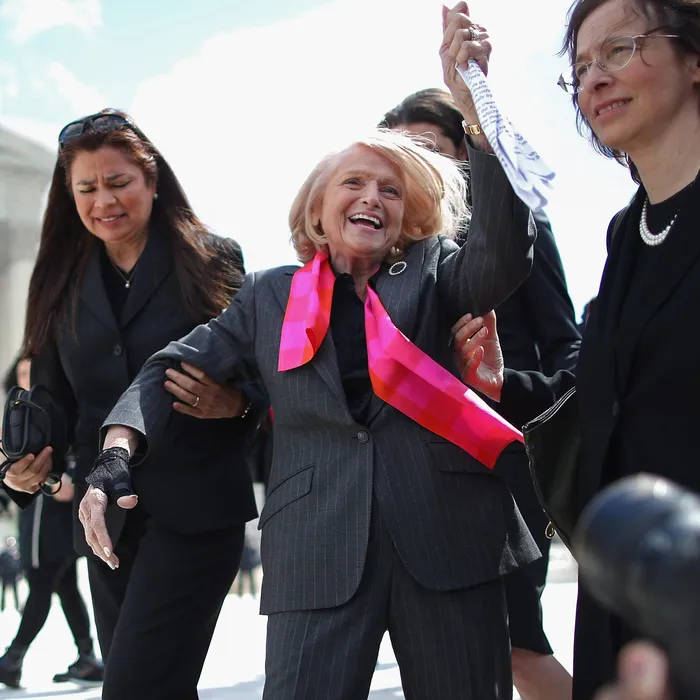
Marriage Equity
Edith Windsor took on the United States for slapping her with an estate tax when her spouse died! The Honorable JUDGE HEATHER FERGUSON examines why the Supreme Court cowtowed to Marriage Equality.

Edith Windsor
Once upon a time, in a land called New York, there lived a beautiful and happy couple. They met at a time when women neither loved nor married other women. Yet in 1967, the pair became “engaged” to one another in a secret ceremony with the exchange of a circular diamond brooch. Neither felt comfortable wearing wedding rings, or answering to the question: “Who is he?” Their companionship would last for 42 years.
When Thea Spyer was diagnosed with Progressive Multiple Sclerosis in 2007, she and her longtime companion—Edith Windsor—traveled to Canada to be married. New York would acknowledge their marriage in Canada, and honor the rights, privileges and protections pertaining thereto. “Marriage however is this magic thing,” Windsor says. “I mean forget all the financial stuff. Marriage symbolizes commitment and love like nothing else in the world. And it’s known all over the world. Wherever you go, if you’re married, that means something to people, and it meant a difference in feeling the next day.”
Spyer passed away twenty-one months after their marriage, legally passing her entire estate to Windsor. The U.S. Federal Government, however, under the auspices of the Defense Against Marriage Act, refused to acknowledge their marriage, slapping Windsor with a $363,000 Estate Tax! At issue is Section 3 of DOMA, which defines marriage as “only a legal union between one man and one woman as husband and wife, and the word ‘spouse’ refers only to a person of the opposite sex who is a husband or wife.” This antiquated definition applies to 1000+ federal laws and regulations and financially punishes a class of people based solely on their sexual orientation. “If Thea was Theo,” Windsor says, “I would not have had to pay those taxes.”
Windsor filed suit for a refund of the federal estate tax, a case now known as United States v. Windsor, and said, “This was not only painful, it was wrong. I knew that Thea would want me to stand up for our marriage—and for so many other gay couples and their families who are harmed by this unjust law. To be honest, I never could have imagined that this day would come: the day that I would be ‘out’ as an 83-year-old lesbian suing the federal government.” Because of a number of procedural and legal issues, this case has been as extraordinary as the couple’s love.
On February 23, 2011, Attorney General Eric Holder released a statement that the Obama administration, and thus the Department of Justice, would no longer defend the constitutionality of DOMA’s Section 3. However, the Department would continue enforcement of the Act until it was either repealed by Congress or declared unconstitutional by the judicial system. “The stated rationale for this dual-track procedure (determination of unconstitutionality coupled with ongoing enforcement) was to recognize the judiciary as the final arbiter of the constitutional claims raised.” The Department’s unusual stand complicated matters as the Department of Justice, and the United States President are charged with the defense and enforcement of laws within our country, something they clearly did not do in this case. That left the Bipartisan Legal Advisory Group of the House of Representatives (BLAG) to take up the cause of defending the constitutionality of DOMA.
Both the U.S. District Court and the Court of Appeals declared Section 3 unconstitutional and through a number of writs and petitions, the U.S. Supreme Court granted certiorari in this case December 7, 2012. The U.S. Supreme Court has declared itself “supreme in the exposition of law of the Constitution” and the issue of the constitutionality of Section 3 landed squarely at its feet. However, the bigger issue in this case is the role and authority of the states in relationship with the federal government. “New York, together with 12 other States and the District of Columbia, decided that same-sex couples should have the right to marry and so live with pride in themselves and their union and in a status of equality with all other married persons.” Historically, the definition and regulation of marriage has been left “within the realm and authority” of each state. DOMA directly opposes and punishes those states which have legitimized and recognized same-sex marriages by refusing to recognize the same. Until now.
After a 6 year journey, the U.S. Supreme Court finally decided this case on June 26, 2013. In an opinion beautifully crafted and written, Justice Kennedy opines for the majority of the Court by declaring, “DOMA is unconstitutional as a deprivation of the liberty of the person protected by the Fifth Amendment of the Constitution. The Act’s demonstrated purpose is to ensure that if any State decides to recognize same-sex marriages, those unions will be treated as second-class marriages for the purposes of federal law. The federal statute is invalid, for no legitimate purpose overcomes the purpose and effect to disparage and to injure those whom the State, by its marriage laws, sought to protect in personhood and dignity.”
Sometimes she talks to Thea about their now-famous case. Referring to the notion of ‘Happily ever after’ Windsor glances at the life-size photo of Spyer in their New York apartment and admits, “I never expected anything less from my government.”






